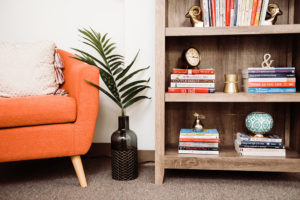We’re in unprecedented times right now and it’s making things… interesting for relationships. No matter how strong your relationship is, staying in a confined space with your partner 24/7 will undoubtedly lead to some challenges. Suddenly, you’re aware of your partner’s every move. You now know what they eat for breakfast, when they take a mid-day brain break, and how they greet people on their conference call (did you know your partner was a “Howdy, guys!” type of person?). And they in turn know these things about you.
Being holed up with your partner without a break poses a unique experience that can either bring you closer together or tear you apart. Follow these helpful tips to take advantage of these circumstances and make the most of your time together.
Boundaries, Boundaries, Boundaries
Let’s face it – aside from a short walk or a quick bike ride, you’re stuck at home day after day after day. And, so is your partner. While you might fantasize about making breakfast together every morning and cuddling on the sofa every evening, the fact is that you probably need some space. Each of you has your own life, independent of the other one, and that doesn’t stop just because we all have to shelter-in-place. So, how can you maintain some independence to do what you need to do (like work!) when your partner is right there? It’s all about boundaries, baby.
Boundaries can be set in a number of different ways. Here are some examples:
- Create a workspace for yourself – ask your partner not to talk to you when you are in the workspace.
- Set certain hours as “work time” or “personal time” – tell your partner that you’re going to focus on specific projects during these hours, and that you need quiet time for this.
- Take time for yourself – make some tea, grab a book, and retreat to a bedroom or patio to give yourself a break.
- Give your partner a break – if your partner needs some space for work or just to recharge their battery, make sure you respect their boundaries, too.
Minor Gestures Lead to Major Points
Create a culture of appreciation, connection, and positivity at home. We’re all inundated with bad news and scary information right now. Even remembering to say please, thank you, and I love you to your partner are small things that can make a big difference. You can also use kindness and acts of service to lighten things up a bit and remind your partner how much you care for them. Here are some ideas:
- Make coffee for your partner if they’re stuck in a never-ending Zoom meeting.
- Surprise your partner and order their favorite snacks to be delivered to the house.
- Do their laundry for them before they realize it needs to be done.
- Let them pick a movie to watch one night – don’t give them a hard time about it, even if it’s one you hate.
The thing to keep in mind with small gestures like this – if someone feels loved and appreciated, they are more likely to show love and appreciation back.
Fight Fairly
You and your partner are bound to have some conflict during these times – it’s normal and to be expected. The important thing is to know how to fight fairly when conflict comes up. Fighting fairly means that you follow certain “rules of engagement”, such as:
Use “I” statements, like “I get frustrated when you…” – this helps avoid blame and makes you responsible for your own feelings
- Avoid the past – focus on the conflict that’s happening right now and don’t bring up something that happened in the past
- Listen to respond, not to react – when your partner is talking, listen with the intention to understand what they’re saying so you can respond thoughtfully to their feelings
- Make generous assumptions – when your partner does something, you can choose to think the worst (ugh, they did that on purpose because it annoys me!) or the best (I’m sure they didn’t mean to do that and weren’t aware of how much it bothers me).
Over the next several weeks, remember that we are experiencing a unique collective trauma that nobody has ever really gone through before. While this makes some things challenging, your relationship should be one source of support for you during this time. If you and your partner are having relationship challenges right now, reach out and schedule a time to meet with us. We’re here to help.

 Nicolle Osequeda, LMFT, is the founder of Lincoln Park Therapy Group, specializing in anxiety, depression, and relationship counseling in Chicago. As a Certified Daring Way™ Facilitator, she incorporates Dr. Brené Brown’s research into her therapy. Nicolle holds a Master’s in Counseling Psychology from the University of San Francisco and is a Licensed Marriage & Family Therapist in Illinois and California. She is a Clinical Fellow of AAMFT, a member of IAMFT, and the Financial Therapy Association. Nicolle has Gottman Method training and has taught at DePaul University, dedicated to helping individuals and couples achieve meaningful change.
Nicolle Osequeda, LMFT, is the founder of Lincoln Park Therapy Group, specializing in anxiety, depression, and relationship counseling in Chicago. As a Certified Daring Way™ Facilitator, she incorporates Dr. Brené Brown’s research into her therapy. Nicolle holds a Master’s in Counseling Psychology from the University of San Francisco and is a Licensed Marriage & Family Therapist in Illinois and California. She is a Clinical Fellow of AAMFT, a member of IAMFT, and the Financial Therapy Association. Nicolle has Gottman Method training and has taught at DePaul University, dedicated to helping individuals and couples achieve meaningful change. 

